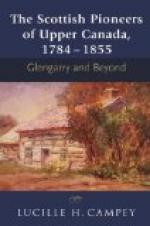The next day he and the other English prisoners were embarked in canoes and taken away to Lake Michigan. On reaching the mouth of that lake, at the Beaver Islands, the Ojibwe canoes, on account of the fog, were obliged to approach the lands of the Ottawa Indians. These last suddenly seized the canoes as they entered shallow water, and professed great indignation at the capture of Fort Michili-Makinak and the slaughter of the Englishmen. They declared their intention of saving the survivors, and charged the Ojibwes with being about to kill and eat them. By the Ottawa Indians, therefore, the twenty Englishmen were carried back again and deposited in Fort Michili-Makinak, which was now taken possession of by the Ottawas. The English were still held as prisoners. After hearing all the Ojibwes had to say, and receiving from them large presents, the Ottawas finally decided to restore their English prisoners to the Ojibwes, who consequently took them away with ropes tied round their necks, and put them into an Indian habitation. Here, as they were starving, they were offered loaves of bread, but with the horrible accompaniment of seeing the slices cut with knives still covered with the blood of the murdered English. The Ojibwes moistened this blood on the knife blades with their spittle, and rubbed it on the slices of bread, offering this food then to their prisoners, so that they might force them to eat the blood of their countrymen.
The next morning, however, there appeared before Menehewehna, the great war chief of the Ojibwes, Henry’s friend and adopted brother, Wawatam. This man made an earnest speech to the council of Ojibwe chiefs and braves, in which he pleaded hard for the Englishman’s life, at the same time tendering from out of his own goods a considerable ransom. After much pipe-smoking and an embarrassing silence, the war chief rose to his feet and accepted the ransom, giving Wawatam permission to take away into safety his adopted brother. “Wawatam led me to his lodge, which was at the distance of a few yards only from the prison lodge. My entrance appeared to give joy to the whole family; food was immediately prepared for me; and I now ate the first hearty meal which I had made since my capture. I found myself one of the family; and, but that I had still my fears as to the other Indians, I felt as happy as the situation could allow.”
The next day seven of the English prisoners were killed by the Ojibwes, and Henry actually saw their dead bodies being dragged out into the open. They had been killed in cold blood by an Indian chief who had just arrived from a hunting expedition, and who, not having been present at the attack on the fort, now desired to satisfy his warlike instincts and his agreement with the policy of the Ojibwes by going into the lodge where the English officers and men were tied up, and slaughtering seven of them in cold blood.




